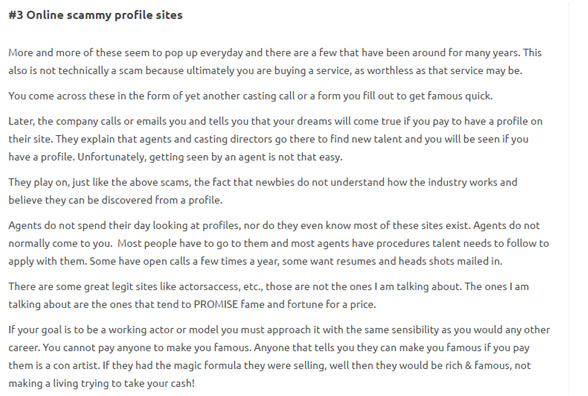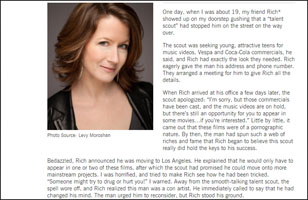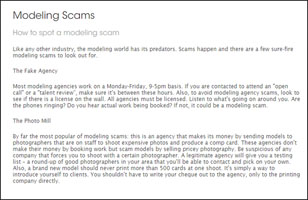Modeling Scams
How Modeling Scams Work
Somebody stops you at the shopping mall or center and says you could be a model. Individuals have constantly said you're attractive, and the thought of a charming vocation is difficult to resist.

However, when you appear for a catch-up arrangement, you end up in an office with other hopefuls. When you finally get your turn, you realize that what you thought was a prospective interview with a modeling or talent agency is actually a high-pressure sales pitch for modeling or acting classes, screen tests, or photo shoots, with costs ranging from a few hundred to several thousand dollars.
We provide the Spam Checker Tool for your convenience. Here, you can enter the email or contact number you suspect to be a scam. This tool checks against our spam database and ensures whether the email or phone number is legitimate or fraudulent.
Modeling scams prey on aspiring models with false promises, exploiting their dreams of a successful career. Fake agencies make unrealistic claims of fame and fortune, often demanding hefty upfront fees for portfolios or services. Phony casting calls and auditions entice individuals into deceptive schemes. Scammers use high-pressure tactics, creating urgency to rush decisions. Exploitative contracts and misleading opportunities take advantage of people genuinely seeking a career in modeling.
To avoid modeling scams, aspiring models should thoroughly research agencies, be wary of upfront payments, verify casting calls, seek professional advice, and trust their instincts when assessing offers that seem too good to be true.
We have compiled a list of reliable online scam-fighting agencies to help you stay updated on current and past modeling scams and their tactics.

If you are a victim of Ghana fraud, submit the scammer's details here.
The modeling industry is expanding rapidly, offering countless opportunities to aspiring models. However, alongside this growth, an entire fraudulent industry is developing to exploit people eager to invest in their dreams. Modeling scams are becoming increasingly common, deceiving individuals with promises of glamorous careers while demanding large sums of money upfront. These scam agencies prey on people's hopes and lack of industry knowledge, capitalizing on their desire for success. As the modeling industry thrives, so do these deceptive schemes, with scammers either taking users' money with no return or charging high fees while offering minimal or worthless services in exchange.
To avoid falling victim to such scams, aspiring models must thoroughly research agencies, verify opportunities, be cautious of upfront payments, and seek advice from legitimate professionals before committing to any offer
How modeling scams operate:
There is a common way in which these modeling scams operate. The basis of modeling scam agencies is fraud and illegal activities. They have no intention of delivering what they guarantee to the user. They only make big promises and demand a huge sum of money from individuals who aspire to become models. These agencies vanish once they have scammed enough users out of their money.
Modeling agencies that fall under the second category are those attempting to run a legitimate modeling business but lack proper industry knowledge. The problem with these agencies is that they do not understand how the modeling industry works. In an effort to establish themselves, they introduce modeling schools, finishing schools, and modeling classes, charging exorbitant fees under the pretense of training.
Users must be cautious of modeling scam schemes and wisely invest their time and money when engaging with modeling agencies.
Modeling scams prey on individuals aspiring to break into the modeling industry. Scammers create fake agencies, enticing victims with unrealistic promises of fame and success. They may organize deceptive casting calls or auditions to lure aspiring models. Exploiting their targets' dreams, scammers use high-pressure tactics, demanding large upfront fees for portfolios or services. Victims may unknowingly sign exploitative contracts with little actual benefit. These scams thrive on deception, taking advantage of individuals seeking legitimate opportunities in modeling. To avoid falling victim, aspiring models should thoroughly research agencies, be wary of upfront payments, and seek guidance from industry professionals before making commitments.
Warning signs of Modeling Scam:
Below are certain points that will help a user identify whether a modeling agency or prospect is a scam or not. It does not necessarily mean that any business falling under the following points is a scam, but users should have a good understanding of the company and double-check before investing in their career with that agency.
? Any modeling agency that advertises in newspapers or classifieds may not be legitimate.
? Many agencies use famous supermodels in their ads and claim they are associated with the agency to attract candidates. In reality, these supermodels may not be affiliated with such small agencies.
? Asking for an advance fee is another common trait of scam modeling agencies. They demand money for signing fees, new account deposits, evaluation fees, etc. When an agency insists too much on advance payments, it may be because they lack funds to sustain their operations.
? Initial shoot costs are another way in which scam modeling agencies extract money from candidates. Legitimate agencies do not charge talented models for shoots but can suggest professional photographers whom models can contact independently, rather than paying the agency.
? A modeling agency that forces candidates to undergo special training before hiring them should be suspected of being a scam.
? Any modeling agency that guarantees employment under any circumstances should be carefully verified and examined, as no agency can promise work—the modeling industry operates under its own rules.
Common claims that scam modeling agencies make:
-
-
"We're scouting for people with your 'look' to model and act."
- "Your deposit is totally refundable."
Fraudulent agencies may claim that deposits can be refunded, but in most cases, victims struggle to get their money back. - "You must be specially selected for our program. Our talent experts will carefully evaluate your chances at success in the field and will only accept a few people into our program."
They create a false sense of exclusivity, making people feel lucky to be chosen while pressuring them to pay fees. - "There's a guaranteed refund if you're not accepted into the program."
Scammers use this tactic to lower people's skepticism, but refunds are rarely honored. - "You can't afford our fees? No problem. You can work them off with the high-paying jobs we'll get you."
They entice victims with promises of jobs, but once money is paid, these jobs either don't exist or don't pay enough to recover the costs. - "Commissions from our clients are our major source of income."
Legitimate agencies earn through commissions from models' work, not upfront fees. If an agency relies heavily on charging models, it may not be genuine.
Scammers use flattery to lure potential victims, making them believe they have a unique appearance suited for modeling or acting. - "Your deposit is totally refundable."
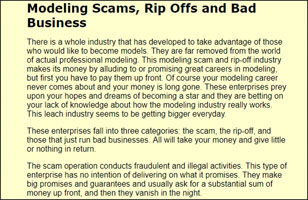
Examples of modeling scams:
Some scam offers in the modeling industry are easy to spot. Unprofessional scammers often fail to create a proper prospectus for candidates, making it obvious that there is something suspicious about the offer.

Below is the story describing a modeling scam company that vanished overnight after charging supermodels an advance fee of $500 under the guise of makeup costs. It was also observed that the company initially lured candidates by offering airline vouchers, job guarantee cards, and other incentives, all of which later turned out to be fraudulent.
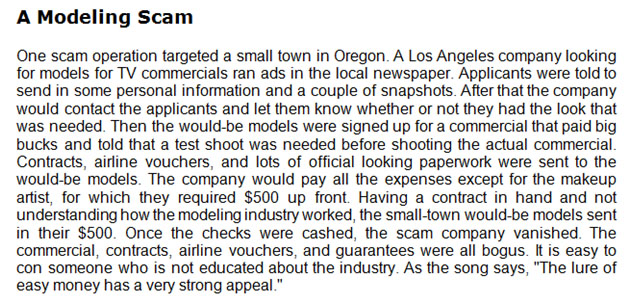
Below is a screenshot showing an example of a potential modeling scam. Candidates should exercise caution when encountering such agencies.
Examples of modeling scams include fake agencies that promise instant success but demand large upfront fees for portfolios or services. Phony casting calls or auditions may be orchestrated to deceive aspiring models. Scammers frequently employ high-pressure tactics, creating urgency to prompt swift payments. Exploitative contracts often contain unfavorable terms with minimal benefits. Some scams lure models with false promises of exclusive opportunities or industry connections. Aspiring models should remain vigilant, avoiding unrealistic claims, excessive upfront payments, and high-pressure tactics. Thorough research is essential to safeguard oneself from fraudulent practices in the industry.
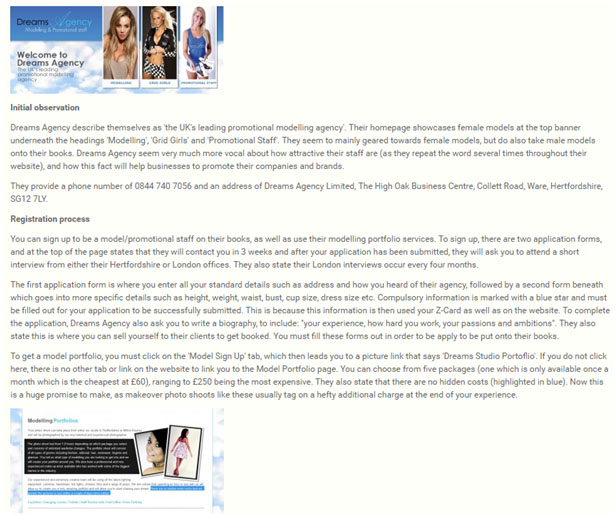
Example of modeling offer ? scam!
Below is an example of a letter received from a real-life victim of a modeling scam. The story describes how it all began with a small newspaper ad, followed by a small fee for shoot photos, and ultimately escalated into a fraudulent scheme that deceived individuals pursuing a modeling career.

Variations in modeling scams:
Scammers have realized that many individuals looking to make quick money by becoming actors or models lack a deep understanding of how the industry truly works. This makes it easier for fraudsters to deceive aspiring models through fake agencies, false promises, and misleading opportunities.

Scammers often mislead users through fraudulent casting calls, claiming they have been selected for a role in a specific show or channel. They deceive victims by demanding upfront fees, such as audition charges or registration costs, under the guise of securing their spot. These scams are widespread, frequently targeting innocent individuals eager to break into the industry.
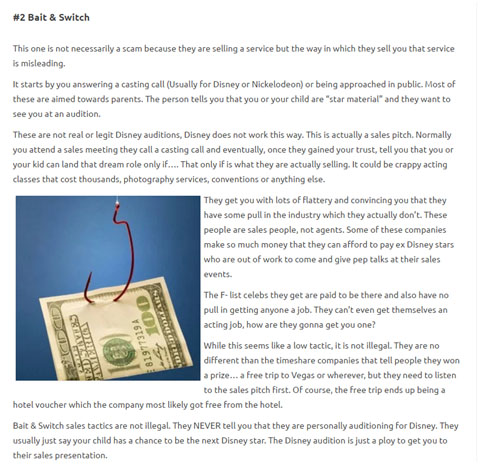
Another loophole through which scammers attract candidates to fraudulent modeling agencies is by advertising on popular websites. These scammers run online scam websites that appear legitimate to aspiring models. The number of such sites is increasing daily, and they frequently appear when browsing the internet.
Modeling scams take various forms to exploit aspiring models. Online casting scams involve fake auditions, collecting personal data from victims. Social media impersonation scams deceive individuals with false promises of success. Virtual modeling scams charge for courses that offer little to no real-world value. Photoshoot scams advertise discounted services but deliver poor-quality results. Subscription-based scams lure models into costly memberships with few or no benefits. Fake talent agencies demand upfront fees without providing genuine representation. Travel scams promise paid opportunities but require large upfront payments for nonexistent arrangements. Fake competitions charge entry fees for unrealistic prizes, trapping models in deceptive schemes. To avoid falling victim, aspiring models must be cautious, thoroughly research opportunities, and seek guidance from reputable industry professionals before making commitments.
